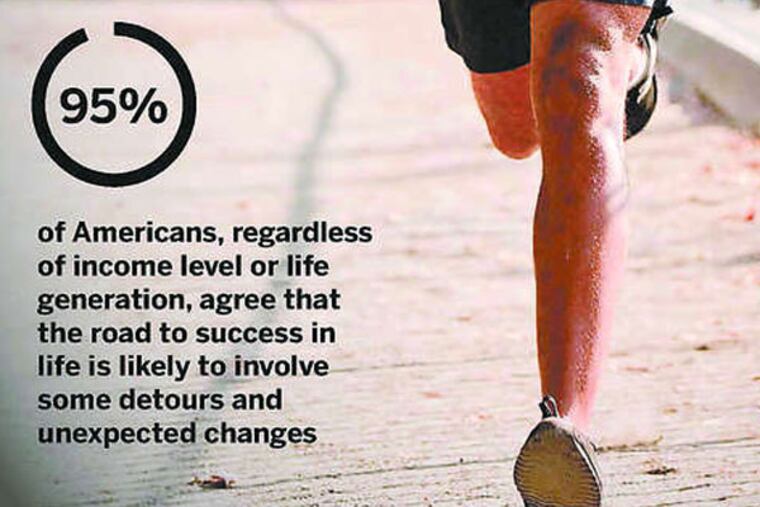Well Being: Taking the measure of happiness
How are you seeking well-being? Are you a Life Twister, a Reinventionist, a Passivist, or a Traditionalist? New survey aims to determine what Americans now regard as success and fulfillment.

How are you seeking well-being? Are you a Life Twister, a Reinventionist, a Passivist, or a Traditionalist?
I ask because of a fascinating survey that came my way recently. The survey, of nearly 2,200 U.S. adults older than 18, was conducted by the Futures Company for American Express, and its aim was to determine what Americans now regard as success and fulfillment.
Money, while important, is at best tangential. Only one in four Americans believes that personal wealth determines success.
"Since the 1980s, America has shifted from a culture that primarily judged success based on external displays of wealth to a society that now places greater weight on less-tangible measures, like life experiences and happiness," the report says. "Research from 1988 to 2012 shows a substantial decrease in the number of people who believe money is the only real meaningful measure of success, and an even more-substantial increase in those who view life satisfaction as a sign of success."
According to the survey, the key attributes of those who say they are successful are: Being open to change (94 percent); finding time for the important things in life (85 percent); enjoying a good marriage/relationship (85 percent); striking a good balance between work and professional life (81 percent); embracing new experiences and changes life throws your way (70 percent); being able to make an impact or difference in people's lives (66 percent); having children (57 percent); giving back to your community/society (56 percent); and having a lot of money (27 percent).
In a move away from materialism, 72 percent said they'd rather spend money on experiences than things, and 81 percent of Americans believe that "knowing how to spend your money well" is far more important to feeling successful than simply having money in the first place (33 percent).
The respondents ranked the elements of success and fulfillment in this order:
1. Good health (85 percent);
2. Finding time for the important things in life (83 percent);
3. Enjoying a good marriage/relationship (81 percent);
4. Knowing how to spend money well (81 percent);
5. Striking a good work/personal life balance (79 percent);
6. Working at a job you love (75 percent);
7. Making time to pursue your passions and interests (69 percent);
8. Being physically fit (66 percent);
9. Embracing new experiences/changes (65 percent);
10. Always trying to learn and do new things (65 percent).
Among the top five items on the "bucket list" for a successful and fulfilling life were:
1. Traveling (88 percent);
2. Having kids (76 percent);
3. Pursuing passions as a hobby or career (75 percent);
4. Volunteering time for a cause you believe in (70 percent);
5. Doing something with your hands (60 percent).
American Express dubbed the survey "The Life Twist Study" because of its most significant finding.
"There's no straight road to success anymore," explains Melanie Backs, manager of public affairs for American Express. "There's no one ladder to success. There are a lot of twists and turns that you take along the way. In fact, 95 percent of Americans believe the road to success involves detours and unexpected changes, and that held true across all income levels and all generations, from boomers to millennials."
Hence, the labels at the top of this column: Life Twisters (52 percent - they have a path mapped out but are open to veering off it); Passivists (25 percent - they don't have a specific path, but go wherever life takes them); Traditionalists (13 percent - they have a path mapped out and are determined to stick to it); and Reinventionists (11 percent - they actively seek change in their lives to reinvent themselves).
"With consumers more likely to expect twists and turns, it's no surprise that 65 percent of Americans report that their goals have changed many times over the course of their lives," the report says. "This represents a much less linear life path than was once traditionally expected. In fact, an overwhelming 83 percent of Americans, including 79 percent of boomers, still consider themselves to be a 'work in progress.' Just as important, the majority of Americans say they are willing to take any number of roads less traveled to achieve their goals."
The scale of how we measure success has been recalibrated, Backs maintains.
"We knew people were interested in new experiences, fulfillment, and following their passions. But what's surprising is how strong those sentiments are, and this definition of success rang true across the board. This is something everybody is embracing at a time when Americans can't seem to agree on much."
Or, as my old-time bodybuilding buddy, the late, great Al Berger, used to say, "Artie, you gotta live while you're livin'. Every day is a bonus; enjoy it to no end. The Brinks truck never follows the hearse."